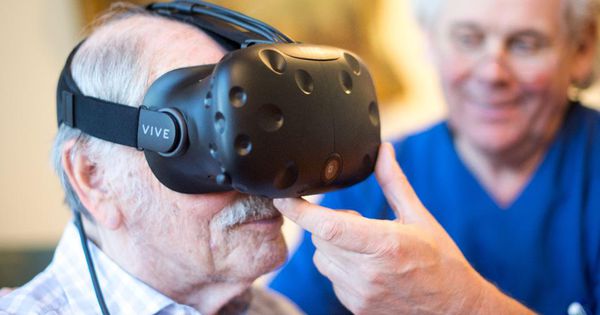
Friedhelm Caspers, head geriatrics physician, putting a pair of virtual reality glasses on a dementia patient in Crefeld, Germany, September 14 2017. Digital assistance may slow dementia and Alzheimers. Patients can move through street scenes from the 1950s and thereby take a trip into their own past. Photo: Marius Becker/picture alliance via Getty Images)
Seeing A Healthier Way With VR
VRHealth, an Israeli health tech company based in Boston, announced a partnership on September 27, 2018, with Oculus to bring their newest health and wellness solutions using a range of Oculus products to the healthcare industry. Currently, VRHealth is using Oculus Go and Rift to provide VR technology solutions for a variety of health challenges, from pain management for birthing mothers and cancer patients during chemotherapy to alleviating patient anxiety before and after surgery.
Its VR platform is already in 30 locations across the United States, from hospitals to rehab centers and out-patient centers, including Stanford Sports Medicine, Spaulding Rehabilitation Network, Hoag Hospital Network and Mass General Hospital’s Sports Medicine Center.
“I truly believe VR will change healthcare and will be in every hospital and every rehab center in three years,” said Orr. “The technology in the VR market is still growing, it’s like the first stage of the iPhone, but as big tech companies, like Oculus, create end evolve their technology our business grows as well. This is not science fiction, we already see the growth and acceptance of VR in the healthcare market.”
If you have ever viewed VR in your regular day to day life, you know how detailed and mind blowing the projections can be, and how much your body senses react to the things you see before you. VR is already being used to train doctors–why not patients as well? Since VRHealth’s launch in May 2018, the weekly compound growth rate in VR treatment has risen 10% across 30 locations.
read more at forbes.com







Leave A Comment